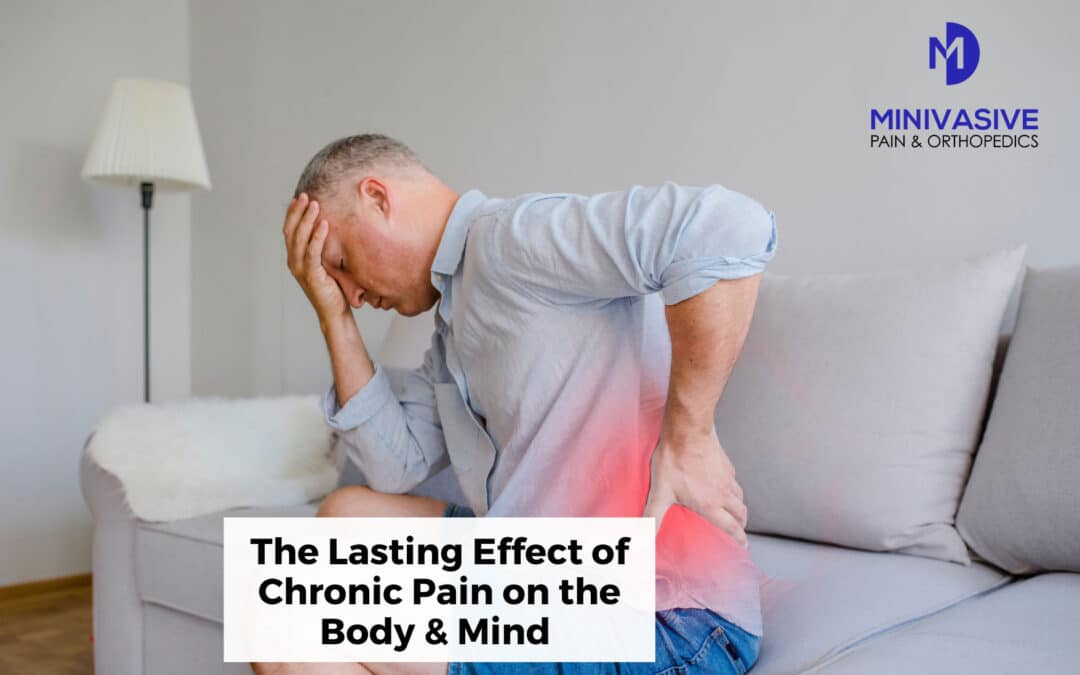Chances are, if you’ve ever dealt with chronic pain, you know all too well that persistent pain and its sometimes inexplicable causes can take a toll on your mental health. Besides increasing your risk for anxiety and depression, chronic pain can lead to sleep disorders, excessive stress, cognition problems and more.
When you’re dealing with pain, your only concern should be how to get back to the joys of your life as efficiently as possible. The last thing you want is to miss out on the things you enjoy most because it hurts too much to participate. Below, our pain specialists outline the many different ways that chronic pain affects the mind just as much as the body.
What is Chronic Pain?
Chronic pain refers to pain that persists for three months or more. Chronic pain interferes with the daily joys of your life and can negatively impact your overall health. Common chronic pain conditions include arthritis, migraines, endometriosis, back and neck pain, and fibromyalgia. Even though these conditions cause different types of pain in different ways, their lingering pain still lingers and resists treatment and medication.
How Pain Affects Your Mental Health
The negative effects of lasting pain can have serious implications for a patient’s mental health. Their emotional and psychological wellbeing can be derailed by the way pain interferes with their daily life. When you suffer from recurrent pain, your work, sleep and even relationships suffer. This can lead to depression and/or anxiety, among other things.
On top of anxiety and depression, pain can affect a patient’s executive functioning, making it more difficult for the patient to think, remember, focus or make decisions. As previous studies have shown, people who suffer from chronic pain have a lower level of long-term memory, processing speed and selective attention than those who do not suffer from chronic pain. This means that your chronic pain could be interfering with the way your brain processes and stores information.
Lastly, chronic pain can lead to an increase of the stress hormone, cortisol, in some patients. An excess of cortisol can lead to the development of diabetes, cancer, and heart disease.
Treatment
As you likely can tell by now, chronic pain affects a patient’s mind and body. When looking for relief, patients can seek a variety of treatment options.
Medication: Medications that increase your levels of “happy hormones”, such as norepinephrine or serotonin, can improve depression and may lead to a positive impact on chronic pain. Only take medication as directed by your doctor.
Cognitive Behavioral Therapy (CBT): During CBT, patients work with their therapist to treat their anxiety or depression by identifying the negative thoughts they stem from.
Support Groups: Getting involved with a group of individuals who are experiencing the same pain and hardships can be comforting. Pain can make social outings and interactions difficult, and support groups can make a patient feel less isolated by providing them with a space where they feel less alone.
Living with Pain: Minivasive Pain & Orthopedics
At Minivasive Pain, our mission is to get you back to the joys of your life by treating the underlying causes of your chronic pain. If you’re struggling with your mental health due to physical health problems, our experienced team of pain specialists can help you with a treatment plan that works for you. If you’re tired of chronic pain getting in the way of all the things you enjoy, reach out to us today for help. With several locations throughout the Greater Houston Area for your convenience, getting your life back on track is just a phone call away. To schedule an appointment, reach out to us at (346) 800-6001 now.

